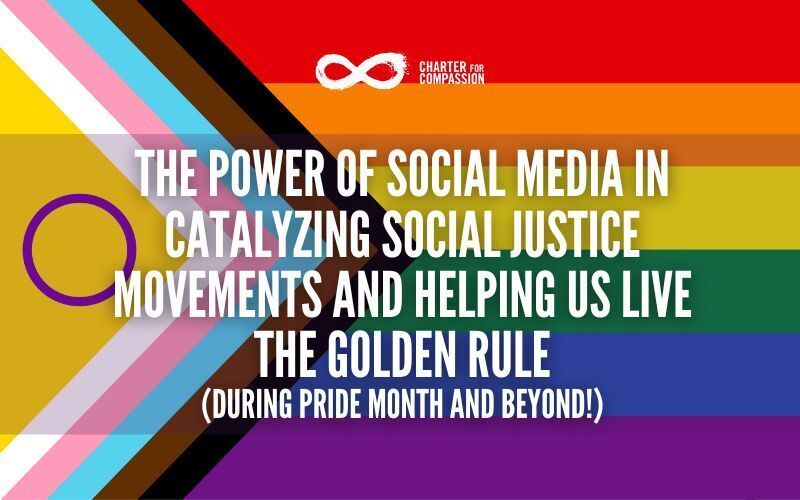
Social Media → Golden Rule → Compassion → Social Justice
In today's digital age, social media has emerged as a powerful tool for catalyzing social justice movements. Platforms such as Instagram, TikTok, Twitter, and Facebook, provide a global stage where voices that might otherwise be marginalized can reach millions. The immediacy and accessibility of social media enable the rapid dissemination of information, mobilization of supporters, and the ability to hold those in power accountable. This democratization of information empowers individuals and communities to advocate for change, organize protests, and foster solidarity across geographical and cultural boundaries.
Amplifying Voices and Mobilizing Action
Social media's capacity to amplify voices has been instrumental in various social justice movements. The #BlackLivesMatter movement, for instance, gained significant momentum through social media, bringing global attention to issues of systemic racism and police brutality. Hashtags like #MeToo have empowered survivors of sexual assault to share their stories, leading to widespread societal recognition and changes in policy and corporate behavior. The same can be said about the horrible things we are watching happen in Gaza, Sudan, Congo, Ukraine, etc. These movements demonstrate how social media can serve as a catalyst for awareness, advocacy, and tangible change.
Calling Out Pink Washing During Pride Month
While social media can be a force for good, it also has the potential to expose and challenge performative activism, such as pink washing during Pride Month. Pink washing refers to the practice of companies and organizations marketing themselves as LGBTQ+ friendly for profit or to improve their public image, without making meaningful contributions to the community. For example big companies like AT&T, (a big phone/communication company in the USA) will paint their logo with rainbows during June, but has funded multiple political campaigns against LGBTQIA+ rights. They’ll have a big float at the Pride parade in your town, to ‘show’ their support, but behind the scenes they are advocating against the people they are supposedly celebrating. This can be found all across fields, with different sized companies, and institutions. Which leaves me wondering who really has ‘my back’?
The Pitfalls of Performative Activism
During Pride Month, many corporations adopt rainbow logos and launch marketing campaigns that target the LGBTQ+ community. However, without substantive support—such as inclusive policies, donations to LGBTQ+ causes, or year-round advocacy—these actions ring hollow. As of late, and due to the amount of information available at our finger tips, social media users are becoming quick to call out these discrepancies, demanding accountability and authenticity from brands. By highlighting examples of pink washing, social media activists encourage consumers to support businesses that genuinely champion LGBTQ+ rights, rather than those merely engaging in symbolic gestures.
This can be applied to our government officials, as well as our own circles in our communities. Do we hear one thing yet see something opposite being done? Are the people we are voting for really doing what they promised when they told us they were going to save the planet by cutting carbon emissions, protect the body autonomy of women, empowering people to be themselves, and loving themselves by living the way they want to live?

The Power of the Golden Rule in Learning Others' Stories
At the heart of social justice movements is the concept of empathy, often encapsulated in the Golden Rule: "Treat others as you would like to be treated." Social media provides a unique opportunity to learn about the lived experiences of others, fostering empathy and understanding across diverse communities. This is how our compassion also grows. At the Charter we define ‘Compassion’ as seeing someone in pain, feeling that pain with them, and taking action to eliminate that pain from that person, even if it doesn’t directly affects us. Social media seen from the lens of the Golden Rule gives us the opportunity to see someone else’s universe and decenter ourselves from ours.
Storytelling on social media humanizes abstract issues, making them relatable and urgent. When individuals share their personal experiences of discrimination, hardship, or triumph, they invite others to walk in their shoes. This personal connection can be a powerful motivator for action. For example, stories shared by transgender individuals about their struggles and resilience can break down prejudices and inspire allies to advocate for transgender rights.
Compassion plays a crucial role in this process
By approaching others' stories with an open heart and mind, social media users can build bridges of understanding and solidarity. Compassionate listening and engagement leads to deeper connections and a more inclusive and supportive community. Most of us, queer people, growing up, probably never saw much support or big advocacy stands with the queer community from our parents, families, or friends. It wasn’t until we came out (and felt accepted and supported [maybe with time, for many of us]) that we saw our circles become more active in advocating for equal rights for us and everyone because they now ‘know’ someone that is going through the injustices the LGBTQIA+ community has gone and is going through. They now have a personal relation, or connection to that marginalized community that was never a priority for them. Social media can help us breach that gap by learning other people’s stories.
Tying It All Together: The Role of Compassion
Compassion is the thread that weaves together the power of social media, the call to action against pink washing, and the Golden Rule. It drives individuals to amplify marginalized voices, hold companies accountable, and approach others' stories with empathy. Compassionate actions on social media can create a ripple effect, inspiring others to join in the fight for social justice. This can begin with a short 1-minute video of a queer kid being bullied in school, to understanding how the systems we’ve grown up in like Capitalism or the Patriarchy are flawed and go against everything that compassion stands for.
Fostering a Compassionate Digital Community
To harness the full potential of social media for social justice, it is essential to foster a compassionate digital community. This involves creating safe spaces for dialogue, supporting those who share their stories, and challenging injustices with kindness and respect. By doing so, social media can be a powerful force for good, driving meaningful change and fostering a more just and compassionate world.
In conclusion, social media's power to catalyze social justice movements lies in its ability to amplify voices, expose performative activism, and foster empathy through storytelling. Compassion is the key to unlocking this potential, enabling individuals and communities to connect, advocate, and effect change. As we navigate the complexities of the digital age, let us remember the power of the Golden Rule and the importance of compassion in building a better future for all.
To end, I would like to share some Instagram accounts that have helped me see and feel other people’s stories. I’ve been taught a great deal in Social Media when it comes to social justice issues, marginalized communities that I don’t belong to but want to support, and the collective pain we are all experiencing as we see greed and pride overtake this world with the many conflicts and tragedies happening around the world.
If you are on Instagram, I recommend you give them a follow, so that YOU can also put to practice the Golden Rule by seeing and hearing their stories.
PinkMantaray
MattXIV
Alok
Indya Moore
Pattiegonia
Intersectional Environmentalist
Kimberly Crenshaw
Marie Beecham
Ijeoma Oluo
Impact
The Slow Factory
Human Rights Watch
And of course, if you aren't yet, will you follow the Charter for Compassion on whichever platform you prefer? Help us by engaging and sharing our content so that we can keep fostering a compassionate digital community as well as a source of inspiration!
Charter for Compassion FACEBOOK
Charter for Compassion INSTAGRAM
Charter for Compassion X
Charter for Compassion LINKEDIN
Charter for Compassion YOUTUBE
With Love,
Felipe


